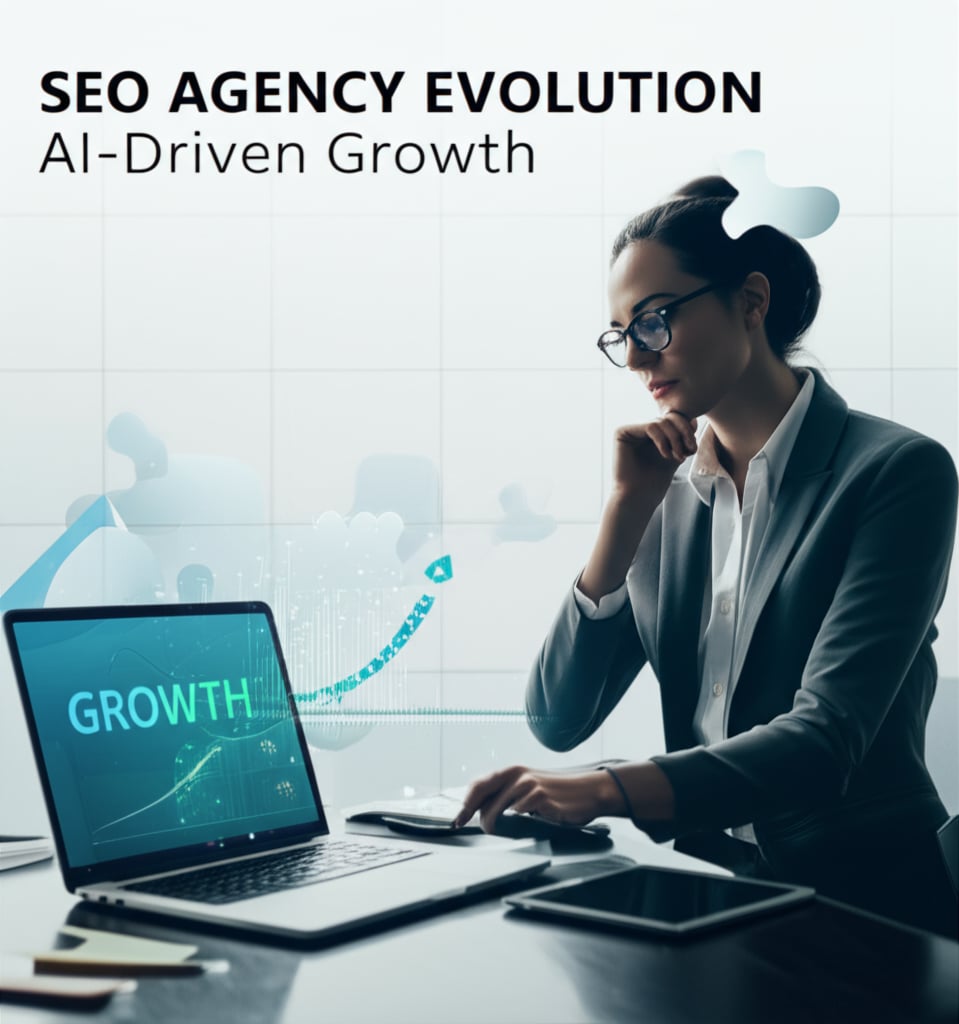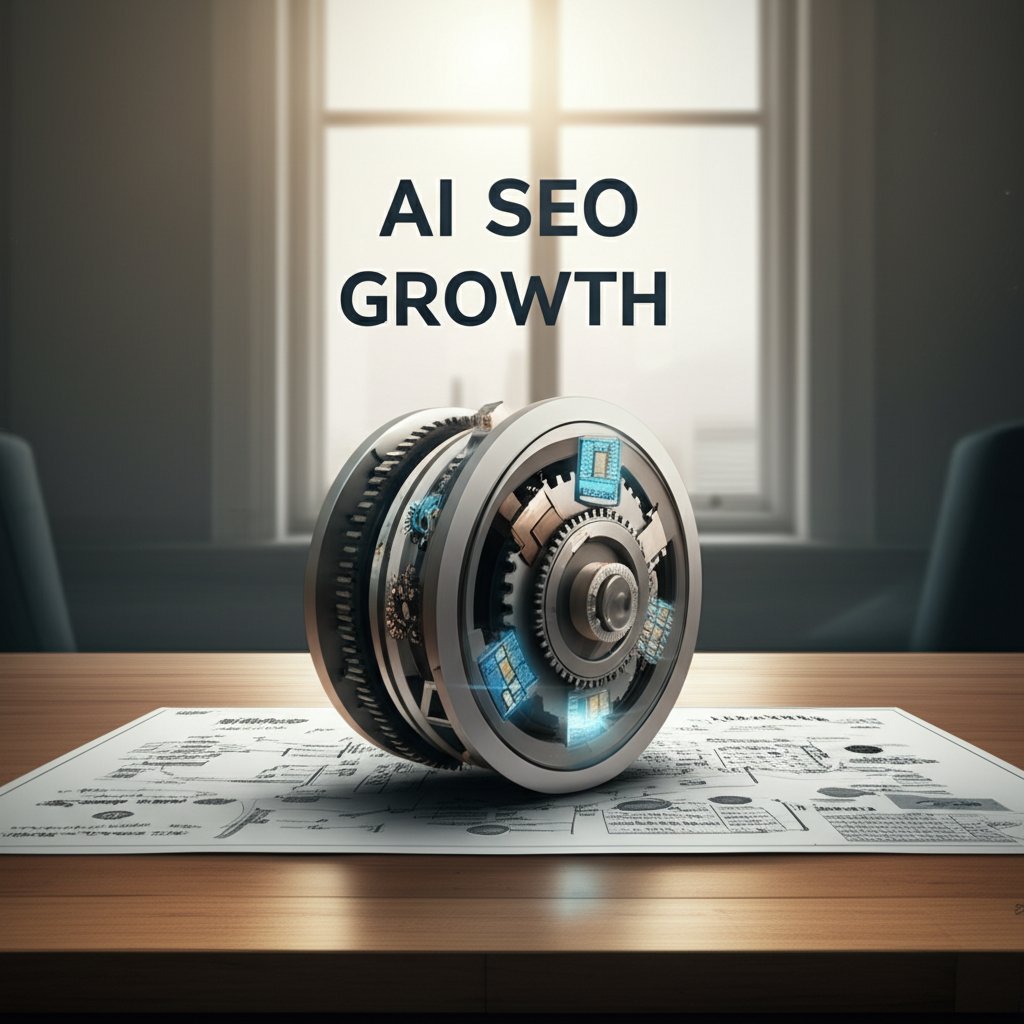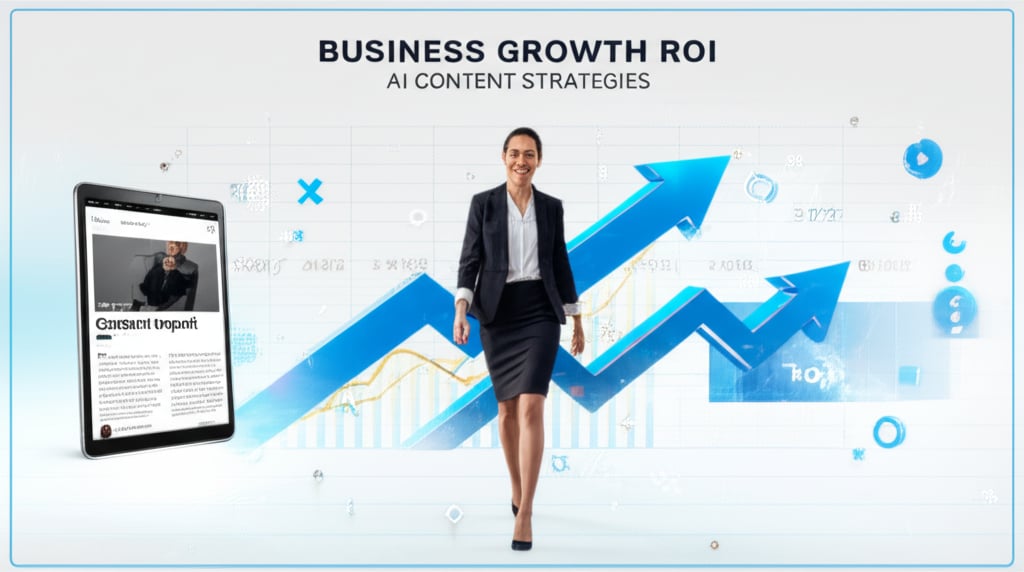AI-Driven SEO Reporting: Unlocking Actionable ROI Insights
Many teams meticulously track SEO metrics, only to find themselves overwhelmed by dashboards that present data without strategic direction. The assumption that more data automatically translates to better insights is a significant fallacy in modern digital strategy. This disconnect leaves organizations struggling to attribute SEO investments to revenue growth, making it difficult to prove a clear Return on Investment. Traditional reporting often lacks the precision to navigate complex market shifts, presenting a fragmented view that requires significant manual effort to connect optimizations to bottom-line impact. This leads to reactive decision-making and a focus on vanity metrics over true business results. AI-driven reporting bridges this gap by transforming raw data into a clear narrative of performance, risk, and opportunity.
TL;DR
The era of sifting through dense spreadsheets to justify SEO performance is over. The new standard is intelligent, automated reporting that speaks the language of business impact.
AI-driven reporting transforms raw performance data into a strategic asset. It automates the complex analysis of metrics, identifies critical trends, and generates clear, plain-language summaries that connect SEO activities directly to revenue and business growth. This shift moves SEO from a cost center to a documented driver of profit. According to a HubSpot report, the overwhelming majority of organizations are increasing their AI adoption, confirming this is no longer a future concept but a present-day competitive necessity.
- Automated Insight Generation: AI eliminates manual analysis, automatically identifying significant performance shifts, anomalies, and opportunities.
- Predictive Forecasting: It moves beyond historical data to forecast traffic, conversions, and revenue, enabling proactive strategy adjustments.
- Direct ROI Connection: AI connects SEO optimizations to core business KPIs, providing clear proof of value for stakeholders.
- Strategic Focus: By handling data compilation, it frees teams to concentrate on high-impact strategy and execution rather than manual reporting tasks.
AI transforms SEO reporting from a complex data dump into a strategic tool that provides clear, actionable insights tied directly to ROI.
Beyond Dashboards: The Problem with Traditional SEO Reporting
Endless dashboards and static reports often create more confusion than clarity. They present a flood of metrics that, without deep context, fail to communicate strategic value to stakeholders.
Traditional SEO reporting is a fundamentally reactive and labor-intensive process. It requires significant manual effort to compile data points like rankings and traffic, which are then left to human interpretation. This workflow consumes hours that could be dedicated to strategic planning. A PwC-advised case study, for instance, documented an international retailer reducing its weekly reporting time from eight hours to just 30 minutes after implementing AI analytics. This inefficiency obscures the connection between SEO activities and the outcomes that matter most: revenue, market share, and customer acquisition.
The core failure of this model is its inability to translate technical metrics into a compelling business case. When leadership receives a report filled with jargon and disconnected numbers, the value generated by the SEO team is lost in translation. This communication gap undermines budget allocation and strategic buy-in.
| Aspect | Traditional Reporting | AI-Driven Reporting |
|---|---|---|
| Data Interpretation | Manual, time-consuming, requires expertise | Automated, instant, surfaces key insights |
| Focus | Historical data (what happened) | Predictive & diagnostic (why it happened & what's next) |
| Time Investment | High; hours spent on data compilation | Low; minutes spent on strategic review |
| Stakeholder Value | Low; lacks clear business context | High; clear connection to ROI and business goals |
Traditional SEO reporting often fails to bridge the gap between performance metrics and tangible business impact, creating a clear need for a more intelligent, automated solution.
What is AI-Driven SEO Reporting? From Reactive to Predictive
AI-driven reporting is not just an evolution of the dashboard; it is a reinvention of how performance is analyzed and communicated. It represents a fundamental shift from data presentation to intelligent insight generation.
This modern approach leverages machine learning and natural language processing to move beyond descriptive analytics—what happened—into the more powerful realms of diagnostic and predictive analytics. Instead of simply showing a traffic dip, an AI engine can diagnose the likely causes, such as a competitor's surge or an algorithm update, and then forecast the potential impact on future revenue. This capability transforms reporting from a passive, historical record into an active, forward-looking strategic tool.
AI tools generate automated narratives that translate complex datasets into concise, plain-language summaries tailored for executive review. This eliminates the need for analysts to spend hours interpreting charts and tables. A McKinsey case study revealed a 60% reduction in campaign planning time after implementing an AI-driven insights engine, demonstrating the immense efficiency gains. The focus moves from the "what" to the "so what," delivering specific, data-backed recommendations that guide decisions.
Note: The transition to AI-driven reporting is not merely a tooling upgrade; it is a strategic evolution from data compilation to insight generation, demanding a shift in focus from metrics to outcomes.
This intelligent system constantly monitors performance, uncovers strategic opportunities, and identifies emerging risks without human intervention. By automating the analytical heavy lifting, it empowers teams to operate with greater agility and strategic foresight. AI-driven reporting fundamentally shifts SEO analysis from a reactive, historical review to a proactive, predictive function that actively guides strategy.
Key AI Capabilities Unlocking ROI Insights
Traditional SEO reports often present a retrospective view of performance, drowning stakeholders in data without providing a clear path forward. This reactive approach is insufficient for teams aiming to grow their market share. The true power of modern reporting lies in its ability to transform historical data into predictive, strategic intelligence.
AI-driven reporting automates this transformation through several core capabilities. It moves beyond simple metric tracking to provide a comprehensive engine for analysis and decision-making. Automated anomaly detection continuously monitors performance, flagging significant deviations in traffic or rankings that demand immediate attention. Predictive forecasting utilizes machine learning to analyze trends and project future outcomes, enabling more strategic goal-setting and resource allocation. These functionalities represent a fundamental shift in how SEO strategy is formulated and executed.
A pivotal capability is Natural Language Generation (NLG), which synthesizes complex datasets into clear, human-like summaries. This is critical for communicating performance to leadership, eliminating the need for manual interpretation. As noted in industry analysis from DashThis (2024), AI-generated insights can instantly identify wins, opportunities, and issues, accelerating the feedback loop between data and action. Furthermore, as search evolves, Generative Engine Optimization (GEO) tracking has become essential. AI tools now monitor brand visibility within generative AI results, providing intelligence on a new and critical channel.
Note: The greatest challenge in reporting is not the complexity of the data, but the clarity of the message. AI-powered narratives bridge this gap, ensuring that insights are understood and acted upon by decision-makers at every level of the organization.
These intelligent systems work in concert to build a complete picture of performance—past, present, and future. They automate the laborious process of data analysis, freeing strategists to focus on high-impact initiatives. By integrating these advanced AI capabilities, teams convert raw data into the actionable intelligence required for strategic growth.
The Framework: Connecting AI Reporting to Tangible ROI
For decades, the primary challenge for SEO professionals has been to definitively connect their efforts to bottom-line financial results. The inability to draw a straight line from keyword rankings to revenue has often relegated SEO to a perceived cost center. This ambiguity is no longer acceptable for results-driven organizations.
An AI-driven reporting framework provides the mechanism to systematically prove financial impact. By integrating disparate data sources—from search consoles and analytics platforms to CRMs—AI builds a unified view of the entire customer journey. A recent McKinsey case study demonstrated this power, reporting a 14% lift in organic revenue within a year of implementing AI-driven insights. This framework moves beyond vanity metrics to quantify the precise contribution of organic search to business growth. Creating such a cohesive framework is a primary goal for many AI content platforms.
Executing this requires a disciplined, multi-step approach that connects activities directly to outcomes.
- Integrate Foundational Data Sources: The process begins by creating a single source of truth. Connect your AI reporting platform with Google Analytics, Google Search Console, and your primary CRM. This integration is essential, as it provides the raw data needed to trace the customer journey from the initial search query to the final conversion event.
- Deploy AI-Powered Attribution Models: Move beyond simplistic last-click attribution. Utilize the AI’s capability to analyze multiple touchpoints and assign appropriate credit to the organic channel. This allows you to identify which specific content pieces, topics, and keywords are most effective at driving qualified leads and sales, not just traffic.
- Calculate SEO-Driven Revenue: Tag and track all conversions originating from organic search within your integrated system. Multiply the total number of organic-driven conversions by your average customer lifetime value (CLV) or average order value (AOV). This yields a concrete dollar figure representing the revenue directly generated by your SEO strategy.
- Report on Cost Versus Return: The final step is to present a clear ROI calculation. Juxtapose the total investment in SEO—including technology, personnel, and content creation costs—against the calculated SEO-driven revenue. This produces a definitive ROI percentage that provides leadership with an unambiguous measure of the program’s financial success.
This structured process demystifies the value of organic search. It transforms the conversation from rankings and traffic to revenue and profitability. By implementing this framework, SEO is repositioned from an operational expense to a documented driver of revenue.
Choosing the Right AI SEO Reporting Tool for Your Business

The market is now saturated with platforms claiming to offer AI-powered SEO insights, making the selection process a strategic challenge. An incorrect choice can lead to wasted investment and a failure to capitalize on the technology's potential. The goal is to identify a platform that functions not as a simple dashboard, but as an integrated engine for strategic growth, an area where platforms like OutblogAI are increasingly focusing.
The optimal tool must deliver robust foundational SEO capabilities alongside its advanced AI features. It must also integrate seamlessly into your existing technology stack to avoid creating data silos. According to analysis from the HubSpot Blog (2024), seamless integration is a primary driver of technology adoption and success within marketing teams. A powerful AI is ineffective if its insights cannot be easily shared and acted upon within your established workflows.
When evaluating potential platforms, a structured approach is critical to ensure the chosen tool aligns with your strategic objectives. Prioritize solutions that translate complex data into clear, actionable directives that accelerate performance and demonstrate value.
| Criterion | Strategic Importance | Key Question to Ask |
|---|---|---|
| Core SEO Functionality | The platform must excel at fundamental tasks like rank tracking, site audits, and backlink analysis. AI features are an enhancement, not a replacement. | Does this tool provide accurate, comprehensive data for all core SEO disciplines? |
| Integration Capabilities | The tool must connect to your CRM, analytics, and project management systems to create a unified workflow and enable ROI tracking. | Can this platform seamlessly integrate with our existing technology stack (e.g., Salesforce, Google Analytics 4, Asana)? |
| Quality of AI Insights | The platform should deliver prescriptive recommendations and automated opportunity identification, not just data visualizations. | Does the AI provide clear, actionable next steps or simply restate the data in a new format? |
| GEO & AI Search Tracking | A future-proof tool must be able to report on visibility within AI-powered answer engines like Google's AI Overviews and Perplexity. | Does the platform offer specific features to monitor and optimize for visibility in generative AI search results? |
Ultimately, the decision rests on which platform best serves your team's unique needs for efficiency and strategic insight. Consider the usability of the interface and the quality of customer support, as these factors heavily influence team adoption and long-term success. Select the tool that most effectively transforms complex performance data into a clear, strategic roadmap for growth.
The adoption of AI-driven SEO reporting marks the final step in the journey from overwhelming data to definitive strategic action. This approach moves beyond incremental improvements, providing a distinct advantage for teams focused on sustainable growth.
Here are the critical takeaways that define this strategic shift:
- AI-driven reporting elevates raw SEO data into clear, actionable insights, directly connecting optimization efforts to tangible business revenue and overarching strategic objectives.
- By automating complex analysis and leveraging machine learning, these systems transform reporting from a reactive summary into a proactive, predictive analysis engine that identifies trends and forecasts outcomes.
- The primary value of AI in SEO reporting is its ability to directly measure and prove the Return on Investment (ROI) of your initiatives, providing clear evidence that links specific optimizations to bottom-line revenue.
Embracing AI-driven reporting marks a pivotal transition from reactive tactics to intelligent, data-led strategy. The logical next step is to evaluate your current reporting frameworks, identify their limitations, and explore advanced AI solutions that prioritize strategic insights over raw data. This investment is the key to elevating SEO performance and securing a lasting competitive advantage.





